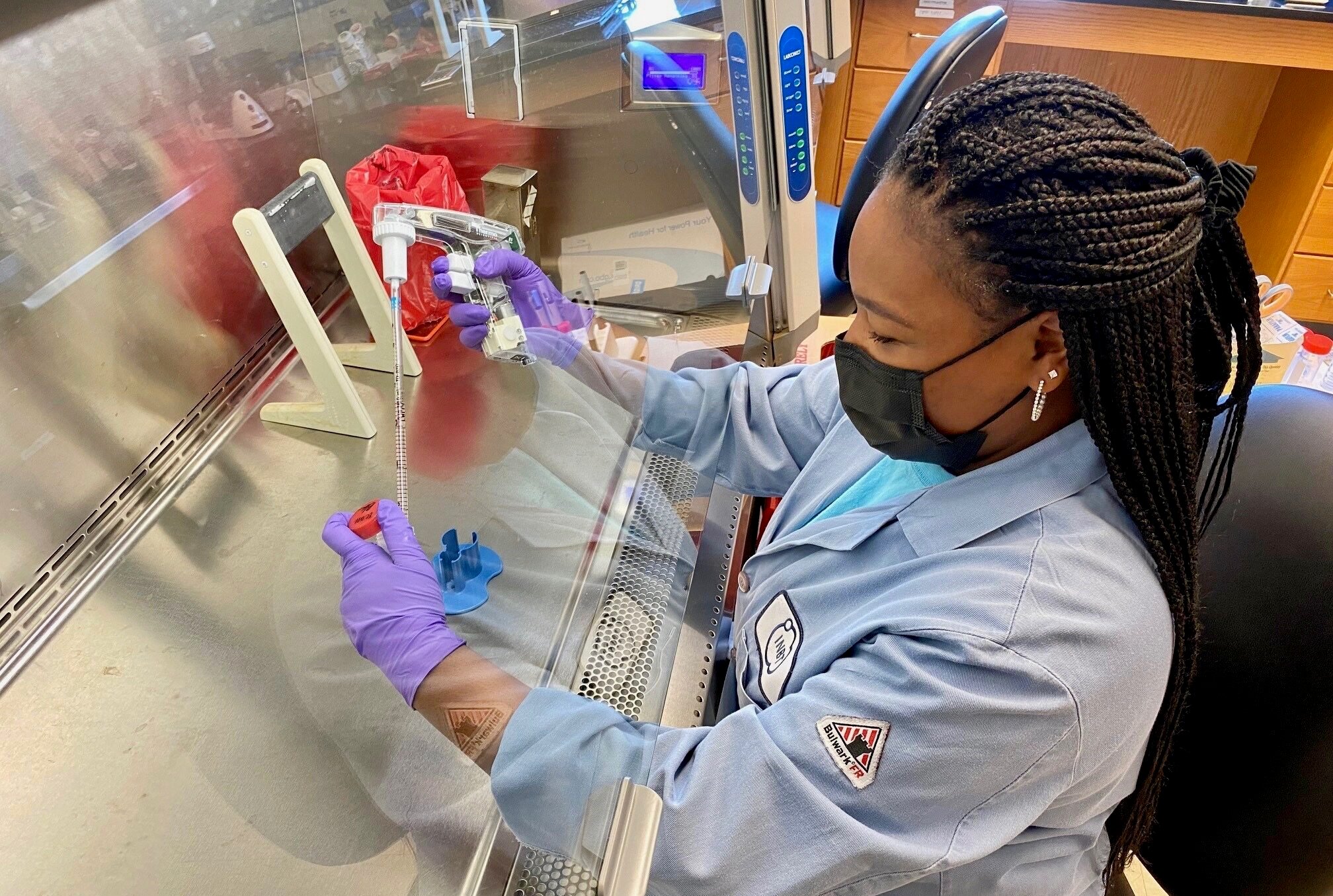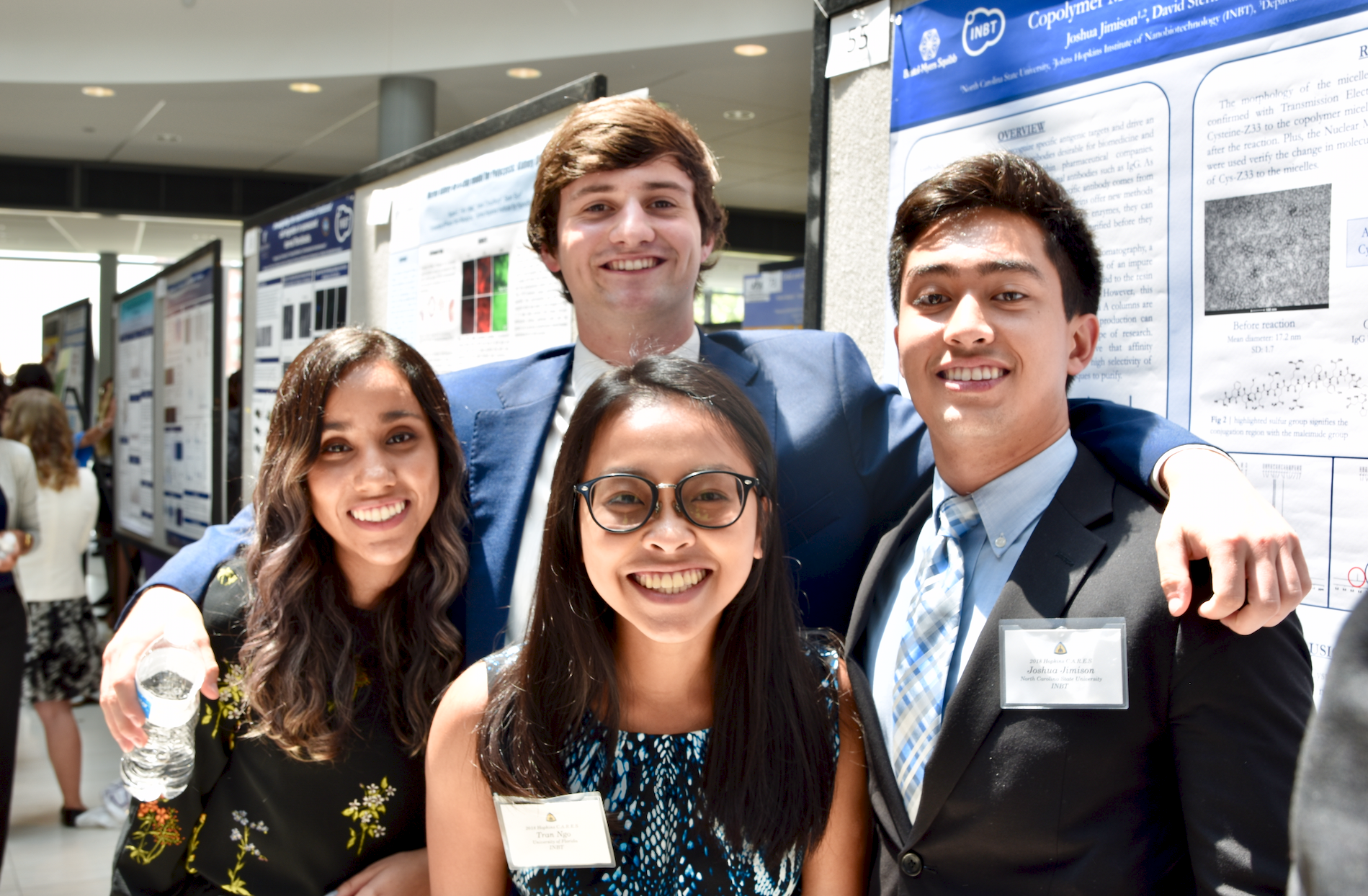The Johns Hopkins Institute for NanoBioTechnology offers undergraduate students from colleges and universities around the United States and its territories a chance to participate in research projects at a world-class research institution in the exciting area of nanobiotechnology, a place where biology, medicine, engineering, and nanoscience meet. The INBT has been administering the Nanotechnology for Biology and Bioengineering Research Experience for Undergraduates (REU) program since 2008 and has successfully hosted 150 students over 15 summers.
The program offers participants many benefits. The most significant is hands-on graduate-level laboratory research experience where students are mentored by world-class faculty* as well as graduate students. During this time students work on their own research project to develop and refine important laboratory and essential skills. Additionally, program administrators schedule a variety of professional development workshops, field trips, social activities, and networking opportunities to meet students and faculty at the INBT and the Johns Hopkins University, as well as explore Baltimore and the surrounding area. The program provides participants with a stipend, paid housing, and travel allowance to concentrate on their research project and other activities.
*The Institute for NanoBioTechnology has many research faculty and those who host REU students in their laboratory rotate from year-to-year. Faculty that have hosted students in the past include: Claire Hur, Denis Wirtz, Efie Kokkoli, Hai-Quan Mao, Honggang Cui, Jeff Wang, Jochen Mueller, Jordan Green, Jude Phillip, Kalina Hristova, Konstantinos Konstantopoulos, Luo Gu, Peter Searson, Rebecca Schulman, Sangmoo Jeong, Sean Sun, Warren Grayson, Xiaobo Mao, Yun Chen, and more.
This is a National Science Foundation-funded program (award number 2244506). The summer 2024 application cycle is closed. The summer 2025 cycle opens November 1, 2024.


The program is 10 weeks and runs from early late May to early August. During this time participants will:
- Run their own research project in a professional laboratory.
- Attend professional development seminars on different topics, including scientific research, tools, and communication skills.
- Conduct an oral presentation of their research to the INBT community.
- Present a research poster presentations at the CARES Symposium at the Johns Hopkins School of Medicine.*
- Attend group social activities, including trips to the Johns Hopkins Applied Physics Lab, NASA Goddard Space Flight Center, and more.
- Explore Baltimore’s rich history and culture, or travel to Ocean City, MD, Washington DC, New York City, Philadelphia, and more.
*The CARES Symposium administrators offer scholarships to participating summer students. Recipients of these scholarships in the INBT NanoBio REU program include Roshni Patel (2023), Nyssa Engebo (2022), Gabriella Bentolila (2022), and Zhenhui Christine Wei (2022).
The INBT’s Research Experience for Undergraduates program aspires to provide students from underrepresented communities in STEM with valuable opportunities to conduct cutting-edge research. Since 2008, INBT’s recruitment efforts have resulted in a very diverse pool of participants. Of the over 150 students hosted, 55% are women, 92% are from groups underrepresented in STEM, and 37% are first generation college students (2019-2022).
Student research projects include topics in cancer and other disease therapies, stem cells and regenerative engineering, diagnostic tools, cell sensing and programming, aging, and more. Below are examples of past project with the faculty mentors name in parentheses.
- Determining DNA Nanotube Internalization in Cancer Cells (Efie Kokkoli)
- A Tissue Engineered Model to Recapitulate Borrelia Burgdorferi Invasion of Dermal Microvessels (Peter Searson)
- 3D Printing at the Micro Scale: Nozzle and Material Design (Jochen Mueller)
- Characterization of the Intracellular Domain of EphA2 in Response to Various Ligands (Kalina Hristova)
- Synthesis and Characterization of Self-Assembling Peptide-Drug Conjugates for ChemoImmunotherapy (Honggang Cui)
- Cell Motility as a Biomarker of Age and Senescence (Jude Phillip)
- Eliminating Parameters for Decreased Variance in Small Hydrogels using Digital Maskless Photolithographic Patterning (Rebecca Schulman)
- Murine Kidney-On-a-Chip Model for Polycystic Kidney Disease (Sean Sun)
- Rare Earth Elements as an Alternative to Calcium in Hydrogel (Luo Gu)
- Toward Exosome Theragnostic: Liposome−Microbead Conjugation Formation and Analysis (Claire Hur)
- Custom Implant Design and Fabrication for Cranio-Facial Trauma and Defects (Warren Grayson)
- Investigating the Mechanisms of Reduced Cell Migration in Senescent Dermal Fibroblasts (Konstantinos Konstantopoulos)
- Mechanical Properties of Hydrogels Utilized for the Biofabrication of Engineered Tissues (Yun Chen)
- Optimization of An Integrated Cartridge System (Jeff Wang)
- Three-Dimensional Mapping of Rhesus Macaque Brainstem Tissue using CODA (Denis Wirtz)
Eligible participants fall under the following criteria:
- U.S. citizens and permanent residents (This is required by the NSF and there are no exceptions).
- Undergraduate students who have completed at least their freshman year and will not be graduating before the start of the program. Students not currently pursuing a bachelor’s degree are not eligible.
- GPA of 3.5 or above.
- Non-Johns Hopkins University students.
- Students from underrepresented backgrounds in science and engineering fields are encouraged to apply.
Prospective applicants should be serious about receiving graduate-level research experience and prepared to actively participate in all assigned activities. We strongly recommend students prepare their application materials early, even before the cycle opens, as the deadline cannot be extended. The summer 2024 application cycle is closed. The summer 2025 cycle will open November 1, 2024.
Application materials must include your:
- Resume
- College transcript
- Personal statement*
- Two letters of recommendation*
*See our FAQ webpage for more information on these documents.
We encourage potential applicants to explore the FAQ and student experiences webpages to answer your questions. You may also contact Sulaiman Jenkins, the Director of Academic Programs, with questions.
If you are a former student participant, we encourage you to fill out our alumni update form to let us know how we can keep in touch with you and how the program shaped your career.


